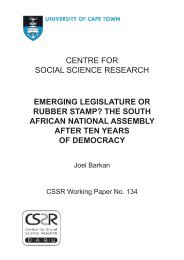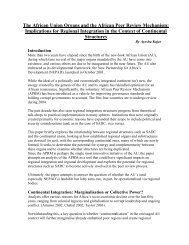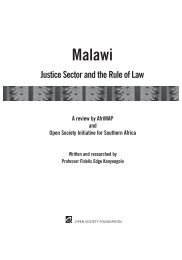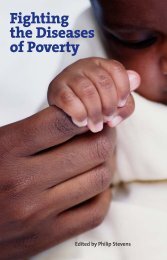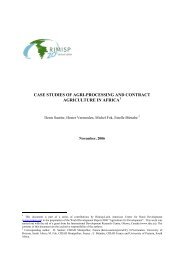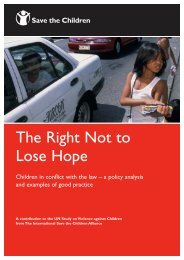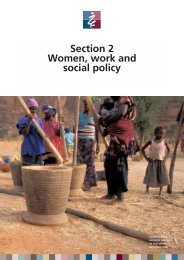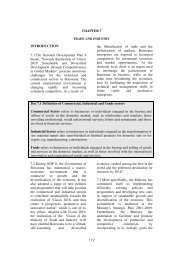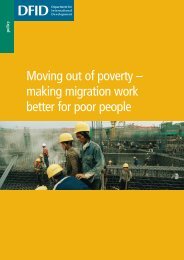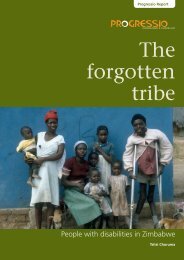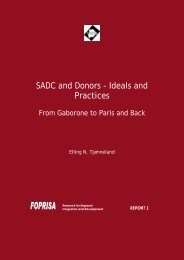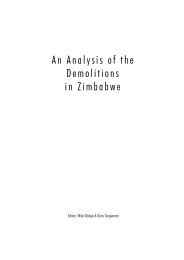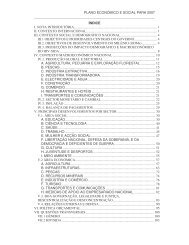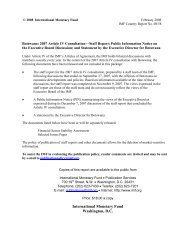Report of the National Conference: Women's Property Rights ... - FAO
Report of the National Conference: Women's Property Rights ... - FAO
Report of the National Conference: Women's Property Rights ... - FAO
Create successful ePaper yourself
Turn your PDF publications into a flip-book with our unique Google optimized e-Paper software.
ownership <strong>of</strong> land through information sharing and advocating for fair policies and lawsthat protect <strong>the</strong> rights <strong>of</strong> <strong>the</strong> vulnerable. In addition <strong>the</strong> Centre commissions and conductsresearch on land matters in Zambia and <strong>the</strong> region. Although still in its infancy, <strong>the</strong>Centre has made some progress towards advocating for <strong>the</strong> rights <strong>of</strong> <strong>the</strong> poor andvulnerable. However, it currently faces challenges around <strong>the</strong> finalisation <strong>of</strong> <strong>the</strong> centre’sconstitution and registration under <strong>the</strong> Perpetual Succession Act.Like many o<strong>the</strong>r NGOs in <strong>the</strong> region, a source <strong>of</strong> funding for sustaining <strong>the</strong> Centre’sprogrammes is also a major challenge. Initial funding provided by Oxfam came to an endin October 2005.4.2 LADA experience on women’s property rights: Mr Eslony Hatimbula, DistrictAnimator (Law and Development Association -LADA)The main activities <strong>of</strong> LADA consist <strong>of</strong> advocacy and lobbying, provision <strong>of</strong> training andparalegal services as well as endeavoring to reduce poverty. Among <strong>the</strong>ir main thrusts is<strong>the</strong> improvement <strong>of</strong> <strong>the</strong> status <strong>of</strong> women and <strong>the</strong> girl child in Zambia. Empowerment <strong>of</strong>women and girls will allow <strong>the</strong>m to question <strong>the</strong>ir position in society.The main driver <strong>of</strong> property grabbing as described by Eslony Hatimbula is greediness.<strong>Property</strong> grabbing is observed to be more prevalent where <strong>the</strong> deceased was rich. LADAhas over <strong>the</strong> years realised that information access and awareness by communities <strong>of</strong>inheritance laws and property grabbing is critical. As such, LADA has embarked onvarious strategies to address this need through• Community sensitisation workshops• Training workshops for both men and women with legal desks opened in manyvillages• Paralegal Kids Programme where kids are trained to give advice within <strong>the</strong>ir ownlevel <strong>of</strong> understanding.• Translation <strong>of</strong> books and radio tapes on inheritance and property grabbingIn <strong>the</strong>se efforts, LADA has learnt that NGOs need to use <strong>the</strong> voice <strong>of</strong> <strong>the</strong> poor inaddressing problems that affect <strong>the</strong>m. Community efforts need to be enhanced byorganising <strong>the</strong>m and finding common issues to be addressed. Networks are better toolsfor advocacy and <strong>the</strong>se should be encouraged among NGOs. There is a need for broaderconsultation at all levels before legislation is passed. Major challenges come whenparalegals fail to attend court cases because <strong>of</strong> lack <strong>of</strong> resources such as transport. Thereis also a growing trend <strong>of</strong> law enforcement <strong>of</strong>ficers becoming <strong>the</strong> perpetrators <strong>the</strong>mselvesthrough property grabbing. In view <strong>of</strong> such complicated cases <strong>the</strong>re is a need forcollective action if women’s rights and those <strong>of</strong> children are to be protected.11



